
|
THE PRESERVATION OF THE QUR'AN By Samuel Green |
|---|
Introduction
When Christians and Muslims talk about God the question of the preservation of the Bible and Qur’an often comes up. Christians are told that the Bible and its message have been changed, and that only the Qur’an is perfectly preserved. Consider what these Islamic leaders say:
The text of the Qur'an is entirely reliable. It has been as it is, unaltered, unedited, not tampered with in any way, since the time of its revelation. (M. Fethullah Gulen, Questions this Modern Age Puts to Islam, London: Truestar, 1993, p.58)
[The Qur'an] was memorised by Mohammed and then dictated to his companions, and written down by scribes, who cross-checked it during his lifetime. Not one word of its 114 chapters (suras) have ever been changed over the centuries. (Understanding Islam and the Muslims, The Australian Federation of Islamic Councils Inc. (pamphlet) Nov. 1991)
No other book in the world can match the Qur'an ... The astonishing fact about this book of ALLAH is that it has remained unchanged, even to a dot, over the last fourteen hundred years. ... No variation of text can be found in it. You can check this for yourself by listening to the recitation of Muslims from different parts of the world. (Basic Principles of Islam, Abu Dhabi, UAE: The Zayed Bin Sultan Al Nahayan Charitable Humanitarian Foundation, 1996, p. 4)
Unlike earlier scriptures the Qur'an has been preserved unchanged in its original Arabic text since the time of revelation, as God had promised within it. History witnessed the fulfilment of that promise, for the Book of God remains to date exactly as it was revealed to the Prophet and recited by him. Immediately memorized and recorded by large numbers of his companions, it was passed on in exactly the same form by thousands of Muslims generation after generation up until the present day. ... There is only one version of the Qur'an; the same revealed words continue to be read, recited and memorized in their original Arabic language by Muslims throughout the world. (Saheeh International, Clear Your Doubts About Islam: 50 Answers to Common Questions, Saudi Arabia: Dar Abul-Qasim, 2008, pp. 28-29)
The Qur'an is the only scripture which has been preserved in its exact original form, in its entire content, as it was revealed to the Prophet fourteen centuries ago, not a word added or removed. This is a historical fact beyond dispute. God Himself has assured us of its preservation (Qur'an chapter 15, verse 9). Thus, there has been only one version of the Qur'an all across the world all through the ages, right from the time of the Prophet. (Al-Ahsa Islamic Center, Before you start reading the Qur'an, Hofus, no date, p. 4)
The Qur'an is the speech from Allah, revealed in its precise meaning and wording through the angel Gabriel, transmitted by many, inimitable, unique and protected by Allah Himself against any corruption. (Ahmad Von Denffer, `Ulum Al-Qur'an, Leicester: The Islamic Foundation, 1994 (Revised edition), p. 21)
The Holy Qur'an is the infallible Word of God, revealed to our Holy Prophet Hazrat Muhummed Mustapha (Peace be upon him) word for word, through the agency of the Archangel Jibraeel, (known as Gabriel in English), and perfectly preserved and protected from human tampering for the past fourteen hundred years! (Ahmed Deedat, Is the Bible God's Word? ch. 3, p. 7)
The Qur'an is the only inspired scripture that has come down to us intact as revealed to the Prophet. There has been no tampering of the text and the original purity of the language has stayed undefiled. The Book had been recorded in writing before the Prophet's death and many had committed it to memory. (Mir Moazam Husain, Introduction to Pickthall's translation, The Holy Qur-'aan: transliteration in Roman script, with original Arabic text, New Delhi: Kitab Bhavan, 1996, p. XXVIII)
In summary, Islamic leaders make the following claims:
Are these claims true or false? For the rest of this article we will consult the Qur’an, Hadith, Islamic scholars, and compare modern Arabic Qur’ans, and see what they actually say about the Qur’an. This article can be downloaded as a printable booklet to give away.
Chapter 1: Did Muhammad simply recite the Qur’an with no change or editing?
No. The Hadith and Qur’an both say that sometimes Muhammad would say a verse and then change it.
Narrated Al-Bara: There was revealed:
“Not equal are those believers who sit (at home) and those who strive and fight in the cause of Allah.” (Qur’an 4.95)
The Prophet said, "Call Zaid for me and let him bring the (writing) board, the inkpot and the scapula bone (the pen) ..." Then he said, "Write: ‘Not equal are those Believers who sit...’", and at that time 'Amr bin Um Maktum, the blind man was sitting behind the Prophet. He said, "O Allah's Apostle! What is your order for me (as regards the above verse) as I am a blind man?" So, instead of the above verse, the following verse was revealed:
“Not equal are those believers who sit (at home) except those who are disabled and those who strive and fight in the cause of Allah.” (Qur’an 4.95) (Sahih al-Bukhari 4990; vol 6, bk 61, no 512, also Sahih Muslim 1898a; bk 20, no 4676-4677)
Here we see an earlier version of verse 4:95 being changed to now include “except those who are disabled”. We see this type of change again in the following example:
Then He [Allah] said: 'O prophet, God is sufficient for thee and the believers who follow thee. O prophet, exhort the believers to fight. If there are twenty steadfast ones among you they will overcome two hundred, and if there are a hundred of you they will overcome a thousand unbelievers for they are a senseless people,'(Q8:65) [...] when this verse came down it came as a shock to the Muslims who took it hard that twenty should have to fight two hundred, and a hundred fight a thousand. So God relieved them and cancelled the verse with another saying: 'Now has God relieved you and He knows that there is weakness amongst you, so if there are a hundred steadfast they shall overcome two hundred, and if there are a thousand of you they shall overcome two thousand by God's permission, for God is with the steadfast.'(Q8:66) (Ibn Ishaq, Sirat Rasulallah, translated as The Life of Muhammad, by A. Guillaume, Karachi: Oxford, 1998, p. 326)
This type of change happened so often that the Meccans used it as a reason to reject Muhammad.
And when We exchange a verse in the place of another verse - and God knows very well what he is sending down - they [the Meccans] say [to Muhammad], "You are simply inventing this". (Qur'an 16:101)
We see this idea again in this verse.
We do not abrogate a verse or cause it to be forgotten except that We bring forth [one] better than it or similar to it. (Qur'an 2:106)
Therefore, when Muslim leaders say the Qur'an was simply recited by Muhammad unchanged and unedited they are wrong. The Qur'an and Hadith both show that sometimes verses were fluid and edited to a final form.
Chapter 2: Was the Qur’an memorized by Muhammad and passed on by memory perfectly to Muslims today?
Again the answer is no.
Narrated Aisha: The Prophet heard a man reciting the Qur'an in the mosque and said, "May Allah bestow His Mercy on him, as he has reminded me of such-and-such verses of such a Surah." (Sahih al-Bukhari 5037; vol 6, bk 61, no 556)
Narrated Abdullah ibn Mas'ud: [... Muhammad said] I am only a human being and I forget just as you do; so when I forget, remind me. (Sahih al-Bukhari 401; vol 1, bk 8, no 394)
We will make you recite, [O Muhammad], and you will not forget, except what Allah should will. (Qur'an 87:6-7)
We do not abrogate a verse or cause it to be forgotten except that We bring forth [one] better than it or similar to it. (Qur'an 2:106)
These verses all refer Muhammad forgetting parts of the Qur’an. Muslim leaders explain this by saying these forgotten parts were abrogated by Allah, but that does not remove the fact that Muhammad forgot parts of the Qur’an.
What about his companions? Did they remember the Qur’an perfectly and pass it on? Again the answer is no. The Hadith records that both during Muhammad’s lifetime and after his death parts of the Qur’an were forgotten.
Narrated `Abdullah: The Prophet said, "Why does anyone of the people say, 'I have forgotten such-and-such verses (of the Qur'an)?' He, in fact, is caused (by Allah) to forget." (Sahih al-Bukhari 5039; vol 6, bk 61, no 559)
We used to recite a surah which resembled in length and severity to (Surah 9) Bara'at. I have, however, forgotten it with the exception of this which I remember out of it: "If there were two valleys full of riches, for the son of Adam, he would long for a third valley, and nothing would fill the stomach of the son of Adam but dust." (Sahih Muslim 1050; bk 5, no 2286)
This surah has been forgotten and is no longer in the Qur’an. We see this again in the following hadith.
Ibn Abbas reported [... Umar said] Allah sent Muhammad (saw) with the Truth and revealed the Holy Book to him, and among what Allah revealed, was the verse of the Rajam (stoning for adultery) and we did recite this verse and understood and memorized it. (Sahih al-Bukhari 6830; vol 8, bk 82, no 817)
The stoning verse is not in the Qur’an today. Finally we read,
`Abdullah bin `Umar reportedly said: "Let none of you say, 'I have got the whole of the Qur’an.' How does he know what all of it is? Much of the Qur’an is gone. Let him say instead, 'I have got what has survived.'" (Jalal ad-Deen as-Suyuti, al-Itiqan fee ‘Uloom al-Qur’an, (Cairo: al-Halabi, 1935) vol. 2, 25)
Therefore, the Qur’an and Hadith are clear that parts of the Qur’an were not remembered and passed on. When Muslims memorize the Qur’an today, they are not memorizing all of what Muhammad recited but only the parts that were remembered. Therefore, the Qur’an has not been preserved by memorization.
Chapter 3: Allah promises to preserve the Qur’an
Surah 15:9 reads,
Indeed we have sent down the Reminder and indeed we are guardians of it. (Qur'an 15:9)
This verse promises that Allah will guard the "Reminder". In this context, "Reminder", is referring to the Qur’an. Therefore the verse is a promise that Allah will guard the Qur'an. Based on this verse, Muslim leaders claim that Allah has promised to perfectly preserve the Qur'an. However, as we have read in the two previous chapters, the Qur’an also says that Allah changes verses and cause some to be forgotten.
We will make you recite, [O Muhammad], and you will not forget, except what Allah should will. (Qur'an 87:6-7)
We do not abrogate a verse or cause it to be forgotten except that We bring forth [one] better than it or similar to it. (Qur'an 2:106)
Therefore, Q15:9 cannot mean that Allah guards the Qur’an from any change or from being forgotten because the Qur’an itself speaks about how Allah changes it and allowed some parts to be forgotten. What Q15:9 can only mean is that Allah supervises the changes that are made to the Qur’an. This is not a promise that the Qur’an will be unchanged, it is actually testimony that it was changed.
Chapter 4: Did Muhammad only have one version of the Qur’an?
Again the answer is no. The Hadith records that Muhammad taught different versions of the Qur'an to his companions.
Narrated Umar bin Al-Khattab: I heard Hisham bin Hakim reciting Surat Al-Furqan during the lifetime of Allah's Apostle and I listened to his recitation and noticed that he recited in several different ways which Allah's Apostle had not taught me. I was about to jump over him during his prayer, but I controlled my temper and when he had completed his prayer, I put his upper garment around his neck and seized him by it and said, "Who taught you this Surat which I heard you reciting ?" He replied, "Allah's Apostle taught it to me". I said, "You have told a lie, for Allah's Apostle taught it to me in a different way from yours". So I dragged him to Allah's Apostle and said, "I heard this person reciting Surat Al-Furqan in a way which you haven't taught me!" On that Allah's Apostle said, "Release him (Umar) recite, O Hisham!" Then he recited in the same way I heard him reciting. Then Allah's Apostle said, "It was revealed in this way", and added, "Recite, O Umar", I recited it as he had taught me. Allah's Apostle then said, "It was revealed in this way. This Qur'an has been revealed to be recited in seven different ways, so recite of it whichever is easier for you." (Sahih al-Bukhari 4992; vol 6, bk 61, no 514)
Umar bin Al-Khattab and Hisham bin Hakim were from the same tribe, therefore, this difference was not a matter of dialect.
Narrated Ibn Mas'ud: I heard a person reciting a (Quranic) verse in a certain way, and I had heard the Prophet reciting the same verse in a different way. So I took him to the Prophet and informed him of that but I noticed the sign of disapproval on his face, and then he said, "Both of you are correct, so don't differ, for the nations before you differed, so they were destroyed." (Sahih al-Bukhari 3476; vol 4, bk 56, no 682)
These hadiths show the companions of Muhammad learned the Qu’ran in different ways from Muhammad. Therefore, Muslim leaders are wrong when they say there is only one version of the Qur'an. From the very beginning there were several versions. These are called the different ahruf.
Chapter 5: How did Muhammad preserve of the Qur’an?
The Qur’an did not start as one complete book. Instead it grew gradually as Muhammad recited different verses in response to different situations in his life. This happened over a 23 year period. Muhammad preserved these words by teaching them to others and on some occasions having them written down. In particularly there were certain men who he commissioned to be teachers of the Qur’an.
Narrated Masruq: [...] I heard the Prophet saying, "Take (learn) the Qur'an from four (men): `Abdullah bin Masud, Salim, Mu'adh and Ubai bin Ka'b." (Sahih al-Bukhari 4999; vol 6, bk 61, no 521)
Therefore Muhammad preserved the Qur’an by teaching the verses himself, authorising other teachers, and having verses written down (Q80:13). However, Muhammad never collected the verses into one book. The following hadith shows it was his companions who decided to do this after his death. They gathered together material from various sources and made their own collections.
Narrated Zaid bin Thabit: [...] "`Umar has come to me and said: "Casualties were heavy among the Qurra' of the Qur'an (i.e. those who knew the Qur'an by heart) on the day of the Battle of Yamama, and I am afraid that more heavy casualties may take place among the Qurra' on other battlefields, whereby a large part of the Qur'an may be lost. “Therefore I [Umar] suggest, you [Abu Bakr] order that the Qur'an be collected." I said to 'Umar, "How can you do something which Allah's Apostle did not do?" [...] Abu Bakr kept on urging me [Zaid] to accept his idea until Allah opened my chest for what He had opened the chests of Abu Bakr and 'Umar. So I started looking for the Qur'an and collecting it from (what was written on) palmed stalks, thin white stones and also from the men who knew it by heart, till I found the last verse of Surat At-Tauba (Repentance) with Abi Khuzaima Al-Ansari, and I did not find it with anybody other than him. (Sahih al-Bukhari 4986; vol 6, bk 61, no 509)
Therefore Muhammad did not supervise the collection of the verses and surahs into one book. Neither did he command it. There is no autograph of the Qur’an from him. It was his companions who made collections of the Qur’an by gathering various verses and surahs from different people.
Chapter 6: Were these collections of the Qur’an the same?
No. As we saw in the last chapter, Muhammad did not make a collection of the Qur’an himself, instead his companions did. They discussed among themselves what material was authentic and what had been abrogated and combined these parts to make their own collections.
Ibn Abbas reported Allah's Messenger (may peace be upon him) as saying: “If there were for the son of Adam a valley full of riches, he would long to possess another one like it, and the son of Adam does not feel satisfied but with dust.” And “Allah returns to him who returns (to him)." Ibn Abbas said: I do not know whether it is from the Qur'an or not; and in the narration transmitted by Zuhair it was said: I do not know whether it is from the Qur'an, and he made no mention of Ibn Abbas. (Sahih Muslim 1049; bk 5, no 2285)It was narrated that 'Aishah said: "One of the things that Allah revealed in the the Qur'an and then abrogated was that nothing makes marriage prohibited except ten breastfeedings or five well-known (breastfeedings)." (Sunan Ibn Majah 1942; vol 3, bk 9, no 1942)
Narrated Ibn Az-Zubair: I said to `Uthman bin `Affan (while he was collecting the Qur'an) regarding the Verse:-- "Those of you who die and leave wives ..." (2.240) "This verse was abrogated by an other verse. So why should you write it? (Or leave it in the Qur'an)?" `Uthman said. "O son of my brother! I will not shift anything of it from its place." (Sahih al-Bukhari 4530; vol 6, bk 60, no 53)
These three examples show that selecting was involved by those who made collections. The main collections were made by the men Muhammad commissioned to be teachers of the Qur’an, men like Abdullah ibn Mas’ud and Ubayy ibn Ka’b. Their collections were not private. They used them to teach entire regions. The Qur’an collection by Abdullah ibn Mas’ud was used in Iraq while the Qur’an collection made by Ubayy ibn Ka’b was used in Syria. These collections were not identical.
Narrated Ibrahim: The companions of 'Abdullah (bin Mas'ud) came to Abu Darda', (and before they arrived at his home), he looked for them and found them. Then he asked them: "Who among you can recite (Qur'an) as 'Abdullah recites it?" They replied, "All of us." He asked, "Who among you knows it by heart?" They pointed at 'Alqama. Then he asked Alqama. "How did you hear 'Abdullah bin Mas'ud reciting Surat Al-Lail (The Night)?“ Alqama recited:
“By the male and the female.” (Qur’an 92:3)
Abu Darda said, "I testify that I heard the Prophet reciting it likewise, but these people want me to recite it:
“And by Him Who created male and female.” (Qur’an 92:3)
But by Allah, I will not follow them." (Sahih al-Bukhari 4944; vol 6, bk 60, no 468, also Sahih Muslim 824a-d; bk 4, no 1799-1802)
This hadith shows two groups of Muslims arguing over a verse in the Qur’an. One group had learned the Qur’an from Abdullah ibn Mas’ud while the other group from another companion. As you can see the difference was not a matter of dialect but of extra words and meaning. We see this again with Ubayy ibn Ka’b. His version of sura 33:6 had the following extra underlined words not found in the modern Qur'an.
The Prophet is closer to the Believers than their own selves, and he is a father of them and his wives are their mothers. (Qur'an 33:6, Abdullah Yusuf Ali, The Holy Qur'an: Text, Translation, and Commentary, 4th ed., Brentwood, Md., U.S.A.: Amana Corp., 1989, footnote 3674)
These extra words make an enormous difference: Should Muslims consider Muhammad their father or not? It depends which companion you learn the Qur'an from.
Narrated Ibn Abbas: Umar said, "Ubayy was the best of us in the recitation (of the Qur'an) yet we leave (out) some of what he recites". Ubayy says, "I have taken it from the mouth of Allah's Apostle and will not leave for anything whatever". (Sahih al-Bukhari 5005; vol 6, bk 61, no 527)
Just as several of the disciples of Jesus recorded the Gospel (Matthew, Mark, Luke, and John) so too several of Muhammad’s companions recorded the Qur’an. In the early years of Islam there were synoptic Qur’ans.
These different Qur'ans were a subject of study for early Islamic scholars. The Arabic librarian, Ibn Abi Ya'qub al-Nadim, made a famous catalogue of all the books in Arabic in the year 375 AH/AD 987. He records seven books under the following heading which dealt with this topic.
Books Composed about Discrepancies of the [Qur'anic] Manuscripts
- "The Discrepancies between the Manuscripts of the People of al-Madinah, al-Kufah, and al-Basrah" according to al-Kisa'i.
- Book of Khalaf, "Discrepancies of the Manuscripts".
- "Discrepancies of the People of al-Kufah, al-Basrah, and Syria concerning the Manuscripts", by al-Farra.
- "Discrepancies between the Manuscripts" by Abu Da'ud al-Sijistani.
- Book of al-Mada'ini about the discrepancies between the manuscripts and the compiling of the Qur'an.
- "Discrepancies between the Manuscripts of Syria, al-Hijaz, and al-Iraq", by Ibn `Amir al-Yahsubi.
- Book of Muhammad ibn `Abd al-Rahman al-Isbahani about discrepancies of the manuscripts.
(Al-Nadim, The Fihrist of al-Nadim - A Tenth Century survey of Muslim Culture, New York: Columbia University Press, 1970, p. 79)
Al-Nadim also notes the following:
Concerning the arrangement of the Qur'an in the manuscript of Abd Allah ibn Mas'ud, Al-Fadl ibn Shadhan said, "I found in a manuscript of `Abd Allah ibn Mas'ud the surahs of the Qur'an in accordance with the following (different) sequence [...] These are one hundred and ten surahs." (Al-Nadim, p. 53)
One of our reliable friends has informed us, saying that the composition of the surahs according to the reading of Ubayy ibn Ka'b is in a village called Qariyat al-Ansar, two parasangs from al-Basrah, where in his home Muhammad ibn Abd al-Malik al-Ansari showed us a Qur'anic manuscript, saying, "This is the copy of Ubayy which we have, handed down from our fathers." I looked into it and ascertained the headings of the surahs, the endings of the revelations, and the numbers of verses. [...] one hundred and sixteen surahs. (Al-Nadim, pp. 58-61)
Abdullah ibn Mas’ud’s Qur’an did not have surahs 1, 113 or 114, that is, there were no du’a prayers. Ubayy ibn Ka’b’s Qur’an is reported to have the following two extra surahs:
Surah 115 al-Khal: O Allah, we seek your help and ask your forgiveness, and we praise you and we don't disbelieve in you. We separate from and leave who sins against you.
Surah 116 al-Hafd: O Allah we worship you and to you we pray and prostrate and to you we run and hasten to serve you. We hope for your mercy and fear your punishment. Your punishment will surely reach the disbelievers. (Ahmed von Denffer, `Ulum al Qur'an, Leicester: The Islamic Foundation, 1985, p. 48)
In summary, these Qur'ans had the following differences:
Some remnants of these different early Qur’ans have recently been discovered in Sana'a Yemen.

The San'ani specimens are, however, not only proofs of their existence, but allow for the hypothesis that even more arrangements were in use which differed from the official sequence as well as from those reported to go back to Ibn Mas'ud and Ubayy. In one case, the end of Surah 26 is followed by the beginning of Surah 37 (on the same page, of course!), which corresponds exactly with the leap reported about Ibn Mas'ud's arrangement. (Gerd-R Puin, “Observations on the Early Qur'an Manuscripts in San`a'”, in The Qur'an as Text, ed. Stefan Wild, Leiden: Brill, 1996, p. 111)
The main significance of the San'a 1 (Standford 07) manuscript is that its lower text does not belong to this Utmanic textual tradition. In this sense, it is “non-Utmanic.” It belongs to some other textual tradition which is designated here as C-1. (Behnam Sadeghi and Uwe Bergmann, "The Codex of a Companion of the Prophet and the Qur'an of the Prophet", Arabica 57, 2010, p. 344)
Therefore, early in Islam’s history there were different Qur’ans. These Qur’ans were the collections of various companions of Muhammad. They were not simply for the personal use but used to teach entire regions. They differed in the number of surahs, the surah order, and the wording of verses. These differences confirm that Muhammad never issued a final collection of the Qur’an.
Chapter 7: What happened to these early regional Qur’ans?
These early regional Qur’ans were not preserved because the differences between them led to arguments within the early Muslim community.
"The Syrians," we are told, "contended with the `Iraqis, the former following the reading of Ubayy ibn Ka`b, the latter that of `Abd Allah ibn Mas'ud, each accusing the other of unbelief." (Labib as-Said, The Recited Koran: A History of the First Recorded Version, tr. B. Weis, et al., Princeton, New Jersey: The Darwin Press, 1975, p. 23)
Yazid b. Mu‘awiya was in the mosque in the time of al Walid b. Uqba, sitting in a group among whom was Hudhayfa. An official called out, "Those who follow the reading of Abu Musa, go to the corner nearest the Kinda door. Those who follow Abdullah's [Ibn Mas‘ud] reading, go to the corner nearest Abdullah's [Ibn Mas‘ud] house". Their reading of Q 2:196 did not agree. One group read, "Perform the pilgrimage to God". The others read it "Perform the pilgrimage to the Kaba". Hudhayfa became very angry, his eyes reddened and he rose, parting his qamis at the waist, although in the mosque. This was during the reign of Uthman. Hudhayfa exclaimed, "Will someone go to the Commander of the Faithful, or shall I go myself? This is what happened in the previous dispensations". (Ibn Abi Dawud, Kitab al-Masahif, p. 11, cited from John Burton, The Collection of the Quran, Cambridge University Press, 1977, p. 142)
The third caliph, Uthman, solved this political problem by commissioning the production of a standard version for the entire Muslim community. He had the other collections destroyed.
Narrated Anas bin Malik: Hudhaifa bin Al-Yaman came to Uthman at the time when the people [Muslims] of Syria and the people of Iraq were waging war to conquer Armenia and Azarbaijan. Hudhaifa was afraid of their [the Muslims of Syria and Iraq] differences in the recitation of the Qur'an, so he said to 'Uthman, "O chief of the Believers! Save this nation before they differ about the Book (Quran) as Jews and the Christians did before." So 'Uthman sent a message to Hafsa saying, "Send us the manuscripts of the Qur'an so that we may compile the Qur'anic materials in perfect copies and return the manuscripts to you." Hafsa sent it to 'Uthman. 'Uthman then ordered Zaid bin Thabit, 'Abdullah bin Az-Zubair, Said bin Al-As and 'AbdurRahman bin Harith bin Hisham to rewrite the manuscripts in perfect copies. 'Uthman said to the three Quraishi men, "In case you disagree with Zaid bin Thabit on any point in the Qur'an, then write it in the dialect of Quraish, the Qur'an was revealed in their tongue." They did so, and when they had written many copies, 'Uthman returned the original manuscripts to Hafsa. 'Uthman sent to every Muslim province one copy of what they had copied, and ordered that all the other Qur'anic materials, whether written in fragmentary manuscripts or whole copies, be burnt. (Sahih al-Bukhari 4987; vol 6, bk 61, no 510)
Uthman’s innovation was to make one Qur’an for the entire Muslim world. The other Qur’ans made by the companions of Muhammad were destroyed, even though Muhammad had commissioned these companions to teach the Qur’an. A simple comparison would be if the early Christians destroyed the Gospel according to Mark, Luke, and John, and just kept Matthew. This may have made things simpler, but Christianity is richer for having preserved all these different testimonies, and Islam is poorer for having destroyed these other testimonies to the Qur’an. The result is that today we have only one testimony to what Muhammad recited. The testimony of the other collections is almost totally lost.
Chapter 8: Did all of the companions of the Muhammad agree with Uthman’s actions?
No, in particular Abdullah ibn Mas’ud objected to Uthman’s actions. Abdullah ibn Mas’ud was personally commissioned by Muhammad to teach the Qur’an.
Narrated Masruq: [...] I heard the Prophet saying, "Take (learn) the Qur'an from four (men): `Abdullah bin Masud, Salim, Mu'adh and Ubai bin Ka'b." (Sahih al-Bukhari 4999; vol 6, bk 61, no 521)
He was the first person after Muhammad to recite the Qur'an publicly.
Yahya b. 'Urwa b. al-Zubayr told me as from his father that the first man to speak the Quran loudly in Mecca after the apostle was 'Abdullah b. Mas'ud. (Ibn Ishaq, Sirat Rasulallah, translated as The Life of Muhammad, by A. Guillaume, Karachi: Oxford, 1998, p. 141)
He even recited the Qur’an to Muhammad.
Narrated Abdullah bin Masud: The Prophet said to me, "Recite (the) Quran to me." I said to him. "Shall I recite (it) to you while it has been revealed to you?" He said, "I like to hear it from another person." (Sahih al-Bukhari 5056; vol 6, bk 61, no 576)
That is, Abdullah ibn Mas’ud was authorised and commissioned by Muhammad to teach the Qur’an to others. However, Uthman did not consult Abdullah ibn Mas’ud when he made his version of the Qur’an, and Abdullah was angry about this, and also angry that Uthman wanted him to hand over his collection of the Qur’an to be destroyed. Abdullah maintained that his collection was just as valid, if not more so, than any other collection. As a result, Abdullah told his students to hide their Qur’ans from Uthman.
'Abdullah (b. Mas'ud) reported that he said to his companions to conceal their copies of the Qur'an and further said: He who conceals anything he shall have to bring that which he had concealed on the Day of Judgment, and then said: After whose mode of recitation do you command me to recite? I in fact recited before Allah's Messenger (may peace be upon him) more than seventy chapters of the Qur'an and the Companions of Allah's Messenger (may peace be upon him) know it that I have better understanding of the Book of Allah (than they do), and if I were to know that someone had better understanding than I, I would have gone to him. Shaqiq said: I sat in the company of the Companions of Muhammad (may peace be upon him) but I did not hear anyone having rejected that (that is, his recitation) or finding fault with it. (Sahih Muslim 2462; bk 31, no 6022, also Sahih al-Bukhari 5000; vol 6, bk 61, no 522)
Az-Zuhri also narrated that Abdullah Ibn Mas’oud became upset because he was not chosen to copy the Qur’an. He said, "Oh you Muslims, how can I not be chosen, and they chose a man who was born to a man who was still an unbeliever (meaning Zaid Ibn Thabet) when I was already a Muslim." Ibn Mas’oud also said, "Oh people of Iraq! Hide your Qurans in your homes (from Uthman)." (Sunan Al-Tirmithi, Dar Al-Kotob Al-ilmiyah, 2008, vol 4, no 3105, p. 134, also Ibn Sa'd, Kitab Al-Tabaqat Al-Kabir, vol. 2 p. 444)
Abdullah ibn Mas’ud was adamant that certain surahs should not be in the Qur’an.
Narrated Zirr ibn Hubaysh: I met Ubai bin Ka’b and said to him: "Ibn Masud used to remove the verses of refuge from the Quranic codices, saying: 'Both of them are not part of the Quran and do not include in it what is not part of it.'" (Muhammad ibn Hibban ibn Ahmad al-Tamimi al-Busti, Al-Musnad al-Sahih ala al-Takasim wa al-Anwa, no 4429)
Sunni and Shia accounts agree with everything said so far. Shia accounts go further and say that Uthman had Abdullah ibn Mas’ud beaten.
Your ulema agree that when Uthman intended to compile the Holy Qur’an, he obtained all the copies from the scribes. He demanded the copy of the Holy Qur’an from Abdullah Bin Mas’ud also. Abdullah did not give it to him. Uthman himself went to his house and took the copy of the Holy Qur’an from him by force. Later, when Abdullah learned that, like the other copies of the Holy Qur’an, his copy had been burnt, he was much aggrieved. In social and religious gatherings, he narrated the condemnatory hadith which he knew about Uthman. When this news reached Uthman, he had Ibn Mas’ud so severely beaten by his slaves that his teeth were broken, and he was confined to his bed. After three days he succumbed to his injuries. (Sultanul - waizin Shirazi, Peshawar Nights, translated by Charles Ali Campbell and Hamid Quinlan, England: Crossland Moor, Islamic Centre, 1996, p. 150)
Therefore not all the companions of Muhammad agreed with Uthman’s innovation, but Uthman was able to enforce his decision and eventually everyone had to accept this. These companions now had to read the Qur’an from Uthman’s text. Had Uthman not enforced his version of the Qur’an, other collections could have remained until today.
Chapter 9: Is the Uthmanic Qur’an complete?
Again the answer is no. As we have seen, there is ample evidence throughout the Hadith of authentic Qur’anic material not included in Uthman’s Qur’an.
We used to recite a surah which resembled in length and severity to (Sura) Bara’at (sura 9). I have, however, forgotten it with the exception of this which I remember out of it: “If there were two valleys full of riches, for the son of Adam, he would long for a third valley, and nothing would fill the stomach of the son of Adam but dust”. (Sahih Muslim 1050; bk 5, no 2286)
Ibn Abbas reported [... Umar said] Allah sent Muhammad (saw) with the Truth and revealed the Holy Book to him, and among what Allah revealed, was the verse of the Rajam (stoning for adultery) and we did recite this verse and understood and memorized it. (Sahih al-Bukhari 6830; vol 8, bk 82, no 817)
This surah about Adam and the stoning verse are not in the Uthmanic Qur'an.
‘Abdullah bin ‘Umar reportedly said: “Let none of you say, ‘I have got the whole of the Qur’an.’ How does he know what all of it is? Much of the Qur’an is gone. Let him say instead, ‘I have got what has survived.’” (Jalal ad-Deen as-Suyuti, al-Itiqan fee ‘Uloom al-Qur’an, (Cairo: al-Halabi, 1935) vol. 2, 25)
Chapter 10: Are the old Qur’an manuscripts identical to the modern Qur’an?
No. The Samarkand manuscript is recognised as one of the earliest extant Qur’ans, but it is not identical to the modern Qur’an. Here are five examples indicated by the rectangles.
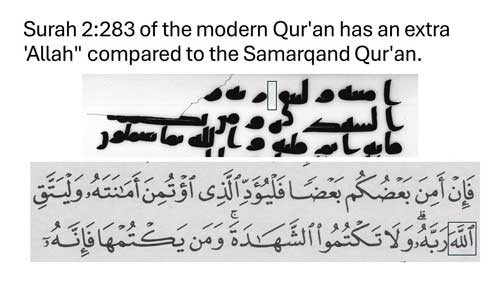
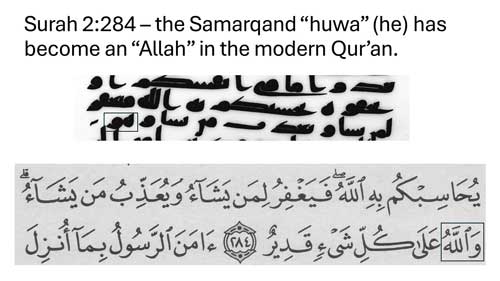
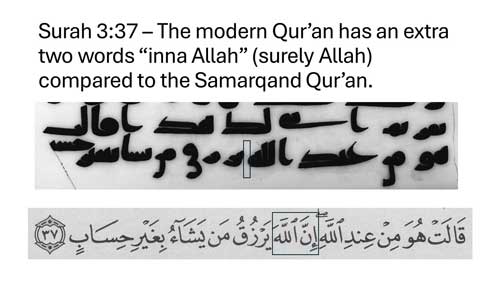
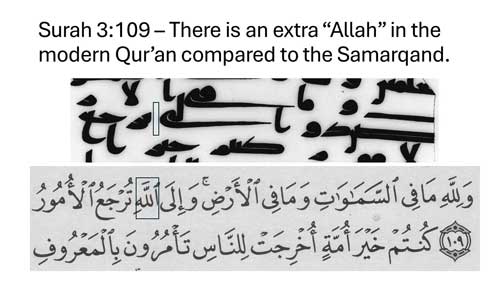
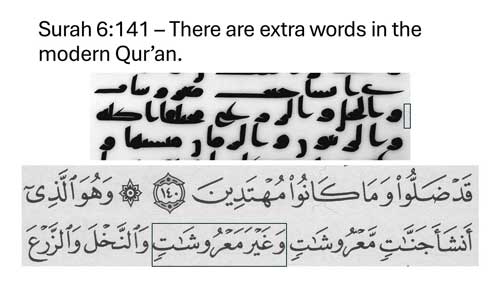
Chapter 11: Are all Arabic Qur’ans used in the world today identical?

Again no. The Arabic script used for the Uthmanic Qur’an did not include vowel markings or the dots to distinguish between certain letters. There was a degree of ambiguity in the script that allowed words to be formed or read in different ways, thus making different words. This led to many different recitations, and in time this became a problem. To solve this problem the Muslim governor, al-Hajjaj b. Yusuf, canonized seven different recitations, but others were added later. Today there are ten different recitations based on the Uthmanic Qur’an.
The Arabic word for recitation is Qur’an, therefore, there are ten different Qur’ans accepted today. The two main Qur’ans are the Qur’an according to Imam Hafs (the most common) and the Qur’an according to Imam Warsh (North Africa). Here are examples of their differences.
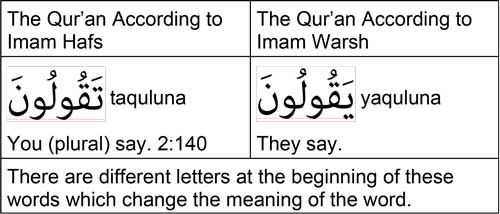
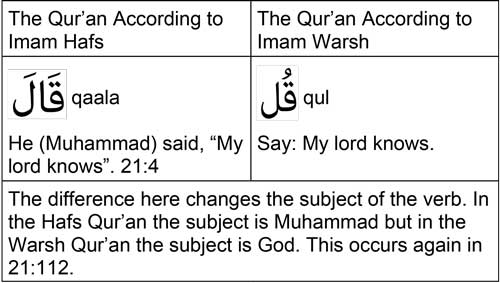
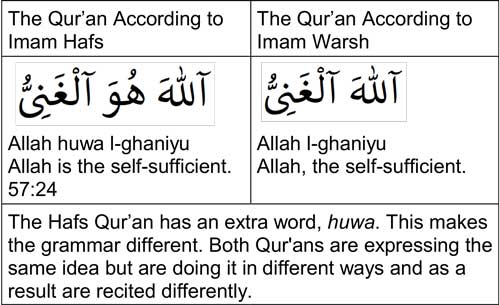
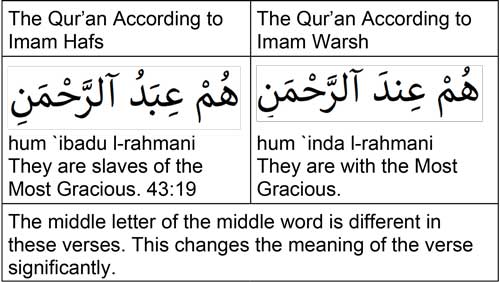
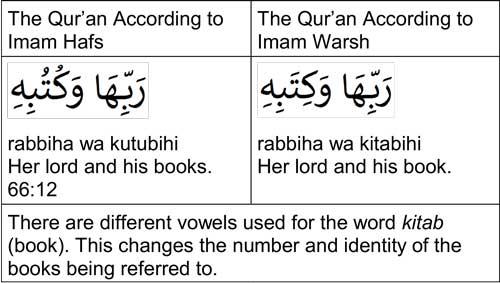
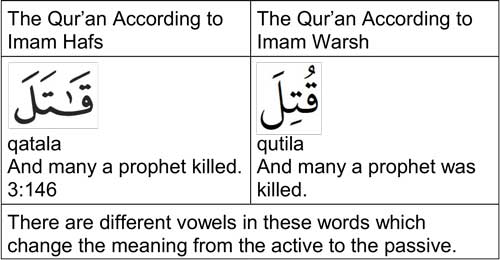
Therefore the Qur’ans used around the world today are not identical. For more information about these different Qur'ans see answering-islam.org/Green/seven.htm
Chapter 12: Are all the variants of the Qur’an authentic?
No. Some of the variants may be authentic but not all of them.
We saw in chapter 4 that Muhammad allowed the Qur’an to be recited in different ways. Some of these differences may well have survived and now be present in the variants that exist between the ten accepted Qur’ans, but there are more variants than those found between the ten accepted Qur'ans.
Below is a six volume encyclopedia set which records many more variants. It is entitled: Mu'jam al-qiraa'aat al-Quraaneeyah, ma'a maqaddimah fee qiraa'aat wa ashhar al-qurraa (The Encyclopedia of the Quranic Readings with an Introduction to Readings and Famous Readers). It gives the details for 10243 variants.

Islamic scholars judge the authenticity of these variants in the same way they judge the authenticity of hadiths. Some are authentic, some are not.
Chapter 13: The 1924 Egyptian Standard Edition of the Qur’an
The most common Qur’an in the world today is called the 1924 Egyptian standard edition. It is based on the Hafs Qur’an.
The standard Egyptian edition of the Qur’an, first published on July 10, 1924 (Dhu l-Hijja 7, 1342) in Cairo, an edition now widely seen as the official text of the Qur’an. Initially, however, the publication of this edition was a purely Egyptian affair. It was the work of a government appointed committee, led by Muhammad b. ‘Ali al-Husayni al-Haddad, that was meant to establish a uniform text for religious education in Egypt. Minor adjustments were subsequently made to this text in following editions, one published later in 1924 and another in 1936. [...] The Egyptian government was motivated to begin the project that would lead to the Cairo Qur’an edition due to the variations (or “errors,” as an appendix to the Cairo edition describes them) found in the Qur’anic texts that they had been importing for state schools. In response, the government destroyed a large number of such texts by sinking them in the Nile River and issued its own text. The Cairo project thus followed in the spirit of the caliph ‘Uthman, and the governor al-Hajjaj b. Yusuf (d. 95/714), who are reported to have destroyed competing versions and distributed their own text of the Qur’an in the first Islamic century. (Gabriel Said Reynolds, The Qur'an in its Historical Context, London: Routledge, 2008, pp. 2-3)
Chapter 14: Does a chain of narration for the modern Qur’an guarantee it is authentic?
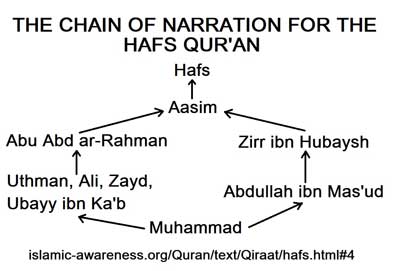
No, because the chains of narration (Arabic: isnad) for the Qur’ans are not reliable.
Like the Hadiths, each of the different Qur’ans are given a chain of narration to prove their authenticity. The chain is meant to show who originally heard this exact way of reciting the Qur’an from Muhammad, and then passed it on to their students. The diagram to the right is the chain of narration for the most commonly used Qur’an today, the Hafs Qur’an.
There are four reasons why this chain is false.
First, as we saw in chapter 5, Muhammad never supervised the collection of the Qur’an. Therefore, there was no final form of the Qur’an from him. The verses and surahs were in different locations and brought together after his death by his companions. They made a variety of different collections with no fixed form. Later, it was Uthman who gave the Qur’an a final form. Therefore, it is impossible for the Hafs Qur’an, in this exact form, to be attributed to Muhammad because he never made a final form.
Second, the chain presented for the Hafs Qur’an claims that Abdullah ibn Mas’ud and Ubayy ibn Ka’b learned the Qur’an in this exact way from Muhammad. This is historically impossible. As we saw in chapters 6 and 8, Islamic history shows that Abdullah and Ubayy learned the Qur’an in different ways compared to the Hafs Qur’an. Their Qur’ans had a different order of the surahs compared to the Hafs Qur’an, they had different numbers of surahs compared to the Hafs Qur’an, and they had different wording for the same verse compared to the Hafs Qur’an. Therefore, a chain claiming that Abdullah and Ubayy passed on the Hafs Qur’an must be false.
We cannot say that Abdullah learned multiple versions of the Qur’an and passed on all of these to his students because if this was the case then his students would not have rejected other readings as we saw in chapter 6, nor would have Abdullah continued to reject the extra surahs Uthman included in his Qur’an, as we saw in chapter 8.
Third, history explicitly says that Abdullah ibn Mas’ud did not learn the entire Qur’an from Muhammad.
[Abdullah] ibn Mas'ud had secured more than ninety of the one hundred and fourteen surahs and the remaining ones he learnt from Mujammi. (Ibn Sa'd, Kitab Al-Tabaqat Al-Kabir, New Delhi, India: Kitab Bhavan, vol. 2, p. 457)Therefore any chain that attributes the entire Qur’an to Abdullah ibn Mas’ud is false, and the chain for the Hafs Qur’an does this.
Fourth, what should the chain of narration for the Qur’an look like? The Qur’an is made up of different parts gathered together from different sources. Zaid collected it from what was written on stones, bones, parchments, and from the hearts of men. Each of these parts had its own unique chain of narration. Therefore, the narration for the whole Qur’an should be a series of different chains each associated with specific part of the Qur’an. But this is not what is presented. Instead, a single chain is presented to represent the whole. This is not possible.
What we can say about Abdullah and Ubayy is that after Uthman enforced his collection of the Qur’an these men now had to recite from Uthman’s Qur’an and not their own. It is therefore possible for there to be chains of narration from the Uthmanic Qur’an which include Abdullah and Ubayy, but these chains would only represent the readings of Abdullah and Ubayy that were compatible with, and transferable to, Uthman’s Qur’an, and would not authenticate an entire Qur’an from Abdullah and Ubayy.
Conclusion
Muslims and Christians are regularly told there is only one Qur’an, that all Qur’ans are absolutely identical, that it was memorised perfectly by Muhammad and his followers, it has never been changed or edited but simply passed down to us today, and because of this the Qur’an is superior to the Bible and its message. However, we have now considered the evidence and found that these claims are either false or exaggerations.
We have seen that Muhammad forgot verses of the Qur’an, changed and edited verses into their final form, allowed several versions of the Qur’an, and never made an authorised version himself. His companions made their own collections and these were different from each other. Uthman enforced one version and destroyed the other collections. Uthman’s Qur’an developed multiple recitations and al-Hajjaj b. Yusuf, canonized seven of these, but others were added later. Today there are ten different Arabic Qur’ans used around the world. There is nothing special about the preservation of the Qur’an.
Therefore do not be deceived by the false and exaggerated claims made by Islamic leaders, and do not let them turn you away from the books of the prophets in the Bible.
Why not read some of the Bible yourself? I recommend that you start with a book from the Bible called Matthew. A good English translation is available here.
Download this article as a printable booklet.
Answering Islam Home Page